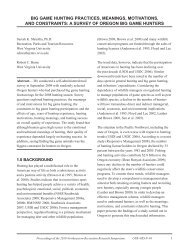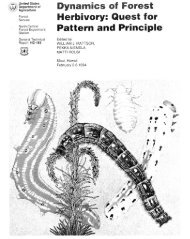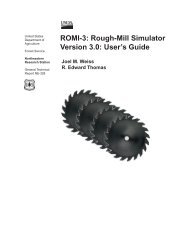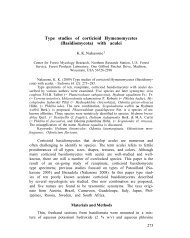Proceedings of the 2009 northeastern recreation research symposium
Proceedings of the 2009 northeastern recreation research symposium
Proceedings of the 2009 northeastern recreation research symposium
You also want an ePaper? Increase the reach of your titles
YUMPU automatically turns print PDFs into web optimized ePapers that Google loves.
Figure 1.—Trends in motivation clusters 1990-2006.<br />
increases <strong>of</strong> Hispanic and o<strong>the</strong>r minority populations<br />
in Texas could be contributing to increased saltwater<br />
participation.<br />
Study results on experience preferences indicated that<br />
relaxation, being outdoors, experiencing <strong>the</strong> fun <strong>of</strong><br />
catching fi sh, and escaping <strong>the</strong> day-to-day routine<br />
remained important reasons for fi shing. Similar<br />
motivation items were also as important in o<strong>the</strong>r angler<br />
studies (Schramm and Gerard 2004). Consistency in<br />
<strong>the</strong> ranking <strong>of</strong> <strong>the</strong> majority <strong>of</strong> <strong>the</strong> motivation items over<br />
time is reasonable because motives are <strong>of</strong>ten viewed as<br />
relatively stable characteristics <strong>of</strong> personality (Atkinson<br />
1964). On <strong>the</strong> o<strong>the</strong>r hand, <strong>the</strong>re were changes in <strong>the</strong><br />
importance <strong>of</strong> a few motivations. For example, getting<br />
away from <strong>the</strong> demands <strong>of</strong> o<strong>the</strong>r people and being with<br />
friends declined substantially in importance. Being with<br />
friends may decline as a primary reason for <strong>recreation</strong>al<br />
fi shing as older anglers leave <strong>the</strong> fi shing population<br />
(Schramm and Gerard 2004).<br />
Results from <strong>the</strong> factor and cluster analyses suggested<br />
that anglers were increasingly concerned with <strong>the</strong> natural<br />
environment and social factors and were less motivated<br />
by escape, challenge, and skill development motives.<br />
We may <strong>of</strong>f er at least two explanations for this trend.<br />
First, anglers from densely populated urban areas tend<br />
to rate escape <strong>of</strong> lower importance since <strong>the</strong>y are aware<br />
that opportunities for fi shing in solitude are limited<br />
(Fedler and Ditton 1994). Increases in <strong>the</strong> population<br />
<strong>of</strong> Hispanic anglers (who tend to prefer family-oriented<br />
<strong>recreation</strong> activities) will positively aff ect <strong>the</strong> number <strong>of</strong><br />
anglers primarily interested in group-based <strong>recreation</strong>.<br />
6.0 CONCLUSION<br />
Th e purpose <strong>of</strong> this study was to monitor changes in<br />
<strong>recreation</strong>al fi shing experience preferences. Th is paper has<br />
several implications for future <strong>research</strong> and management.<br />
First, this study demonstrates <strong>the</strong> potential for using<br />
secondary data to document baseline participation and to<br />
identify change over time. Th is study also demonstrates<br />
<strong>the</strong> value <strong>of</strong> examining data from regional populations.<br />
Many <strong>recreation</strong>al trend studies still rely on national<br />
surveys, while attention should be paid to regional<br />
populations and to related social and environmental<br />
changes – factors which can impact fi shing mode and<br />
motives. Managers using generalized results from<br />
national surveys may encounter local resistance to<br />
proposed statewide regulations. O<strong>the</strong>r data sources are<br />
needed to identify regional and national diff erences.<br />
Finally, as anglers increasingly report motivations related<br />
to social and environmental factors, <strong>research</strong>ers and<br />
managers need to look beyond motives to understand<br />
<strong>the</strong>ir behaviors. O<strong>the</strong>r forms <strong>of</strong> longitudinal study,<br />
such as panel surveys (i.e., <strong>research</strong>ing <strong>the</strong> same anglers<br />
over time) could be used to understand micro-level<br />
changes. Th is study supports <strong>the</strong> need for more <strong>research</strong><br />
on <strong>the</strong> relationships between motivational changes and<br />
behavioral responses over time, and provides support<br />
for including o<strong>the</strong>r variables (such as setting preference,<br />
<strong>Proceedings</strong> <strong>of</strong> <strong>the</strong> <strong>2009</strong> Nor<strong>the</strong>astern Recreation Research Symposium GTR-NRS-P-66<br />
133
















